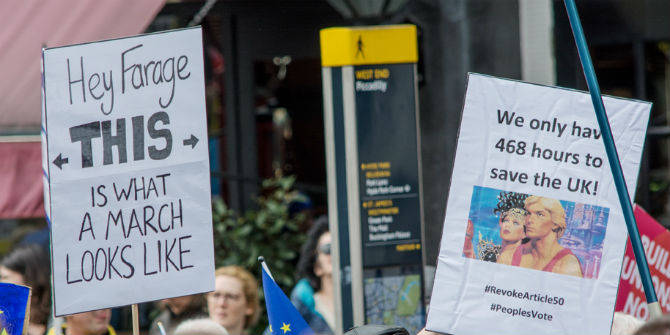 EU citizens living in the UK will reportedly be asked to register in ‘a first step towards regularising’ their legal status post-Brexit. But the purpose of this move is unclear, writes Tanja Bueltmann. It comes after a year of uncertainty during which many EU citizens, concerned about their future in the UK, have decided to leave. And it offers no clarification on whether the rights they currently enjoy – such as pensions and access to the NHS – will continue after March 2019.
EU citizens living in the UK will reportedly be asked to register in ‘a first step towards regularising’ their legal status post-Brexit. But the purpose of this move is unclear, writes Tanja Bueltmann. It comes after a year of uncertainty during which many EU citizens, concerned about their future in the UK, have decided to leave. And it offers no clarification on whether the rights they currently enjoy – such as pensions and access to the NHS – will continue after March 2019.
EU nationals in the UK have been asking the government to take action to guarantee our status and rights for nearly a year. We want to resolve the (by now pretty unbearable) limbo we find ourselves in (as do Britons in other EU countries). So in that sense a movement forward is welcome. I also fully appreciate that there will have to be some process and documentation. However – and while we will need to wait for the government’s full proposal to establish what exactly the plan is – the Guardian’s report raises a number of very troubling questions.
First and foremost I am concerned about the purpose of the registration process. The Guardian report refers to this as a ‘stocktaking exercise’—an unfortunate and ill-judged choice of terminology and hopefully not one used in the actual government proposal. Reportedly, the idea is that all EU citizens would be invited to ‘“register their interest” in acquiring documentation allowing them to live and work’ in the UK after Brexit in 2019. Is it not an established fact that we are, of course, all interested in this? Campaigns like The Three Million have made this abundantly clear for a long time, have been lobbying the government and set out ways forward. So of course the idea of registering is not to establish our interest, nor the potential volume of applications. The purpose of registration undoubtedly relates to one simple fact: that the UK government does not actually know who we are and cannot identify us. Admitting that fact, unsurprisingly, gave the anti-EU and anti-migrant press a field day.

So what we are looking at here, then, is a case of the UK government passing the buck and putting the onus on EU nationals to identify ourselves. As a German — Germany has ID cards — I have no general problem with registering, but in the context of just registering EU nationals, and with a lack of clarity, this is much more problematic. In any case, surely a combination of records could achieve a form of automatic registration, certainly for the majority of EU nationals in the UK. But apparently not – so let’s introduce yet another hoop for EU nationals to jump through instead.
What troubles me most in relation to this is that it is a change in position. In September 2016 the then immigration minister Robert Goodwill, answering questions by Labour’s Chuka Umunna at a meeting of the Home Affairs Select Committee, confirmed that the government is ‘not in a position [to identify every EU citizen]’. Critically, he also added that the government ‘have made it clear also that there is no need for anyone to get additional documentation to prove that [the right to stay etc]’, concluding that ‘I find it difficult to see a circumstance in which we would want to be in that situation’ (link to full transcript). Well, not all that difficult, apparently. Read within the context of these remarks, the registration proposal, if delivered as reported, is yet another punch in the face — yes, let’s call it that as that is exactly what it feels like to me, and I am sure many other EU nationals in the UK, each time there is another twist in the tale – an assurance by a government minister broken within a few months. But I suppose I ought to appreciate what a problem this is for the UK, right? After all, what a real ‘bureaucratic nightmare’ it is.
But the question of the true purpose of the move remains. Why would EU nationals wish to register for something if it is just to gauge our numbers, rather than as part of the actual process to secure status? The full proposal may yet offer more details, but I am not sure it will – after all, the government has already had nearly a year to establish this. We must not end up in a situation where a useless extra layer of bureaucracy complicates the situation even further. Additionally, many EU nationals in the UK – probably the majority – simply do not trust the government.
Let’s not forget the critical problem: while the line since 24 June 2016 has been that the intention is to guarantee our rights, every single opportunity to do so before the triggering of article 50 was not taken. We were made bargaining chips instead, and the EU, Germany in particular, was blamed for failing to play ball. What is rarely reported in the UK press is that the issue was not citizens’ rights, but the fact that Theresa May sought to tie them up with trade talks and other issues. So I want to be clear: it has been the UK government, and the UK government only, that made citizens’ rights an issue. That fact alone would make any new proposal that is not a straightforward recognition of our rights another low point.
What is particularly irritating is that if the government really does need us to register, why was that not started last year? Why leave us in limbo for this length of time? Why create a situation in which we become bargaining chips? Why cause further anxiety for many by automated processes such as sending out letters asking EU nationals to prepare to leave the UK? It may be poor planning, it may be ineptitude. But it may also be quite deliberate. After all, thanks to all this uncertainty and the hostile climate, a significant number of EU nationals have already decided to leave the UK or are not coming anymore in the first place. That reduction may well be welcomed by the government, given it will go some way towards May’s immigration target.
Finally, it is also a concern to see – at least in the Guardian article – only a reference to the right to live and work in the UK after 2019. Of course that is critically important, but we now hold a range of other rights, from pensions to NHS access. What about those? Furthermore, these rights are ones that Britons in the EU also enjoy reciprocally. So if the UK government were to go ahead and restrict the rights of EU nationals in the UK, there will be a wider implication. Given David Davis’s recent comment that he considers EU proposals about citizen rights make ‘ridiculously high’ demands, I won’t hold my breath. What we are asking for is nothing more than the maintenance of the status quo. This is not ‘ridiculously high’ – nor is it, as I was told recently, ‘claiming privilege’. I, like millions of EU nationals, came here because we were invited to come and work here. We made life choices and came in good faith. Surely that should long since have been recognised.
I would be delighted if my concerns prove unfounded. So far in Brexit Britain they never have been. In any case, the idea of selectively registering particular groups of people does not sit well with me as a German. Nor does the fact that the EU’s position on the rights of EU citizens has been clear for a long time. On Monday, best duck and cover.
This post represents the views of the author and not those of the Brexit blog, nor the LSE.
Tanja Bueltmann is an Associate Professor in History and Acting Head of Department at the University of Northumbria.
Abused in the street, invited to a Brexit BBQ: the limbo of being German in the UK







We are too inward looking. I feel we will lose the respect of our neighbors. Which will be damaging on a much wider scale than what we have imagined. Looking at how Europe has reacted to Brexit has been eye opening. We have become a laughing stock.
What a moan fest – feel better now?
Very judgemental, Karl
Try consideration and thinking?
Extremely hard to believe the government doesn’t know who we are. After all are we not registered with local councils and pay council tax? Electoral roll? Have NI numbers?
Karl are you an EU citizen?
It seems that there is some problem with EU citizens in the UK having to register, but us UK citizens when taking up residency in Spain had to register and apply for “Residencia” passports copied fingerprints taken etc and proof that we could support ourselves before it was granted, I do not see the problem with EU citizens living in the UK, having to do something similar
Yes, if that is what everybody in the country has to do. But not if it is a special requirement for a special group.
The squeaky wheel gets the grease and the three million plus EU other nationals in the UK are halfway there. The entitlement wheeze is one which so far is indulged in by the go-getters from the far Left to the Conservative Right, with the transnational corps and their minions in government leading the way, and indulged by government, the bureaucrats and federalising/globalising technocrats as long as the entitlements are sought by strident supporters of globalisation. One can hardly blame the go-getters for doing anything in their might to retain privileges they believe themselves to be in danger of losing, and to that end they keep inflating their privileges to the status of rights. The author is German, invited to work in the UK. That was never a lifetime guarantee to rights as a UK citizen, or was it?
Tanja,
I’m sorry, I think your objections are overblown. As you state there is a similar registration system in Germany, which every adult will know (typically you have to show a government office your passport or identification card plus some proof of address, such as a letting agreement). If by doing this you get the lifelong right to remain in the UK it seems to me a good deal.
You state “in the context of just registering EU nationals, and with a lack of clarity, this is much more problematic.” But registering everyone, not just EU nationals, would mean moving to a completely different system, Why should the UK have to do this, just to solve a particular problem involving ensuring the rights of EU nationals? “In any case, surely a combination of records could achieve a form of automatic registration, certainly for the majority of EU nationals in the UK”. Perhaps by combining electoral registers + tax records from central and local government + NHS records you could cover 95% or so of EU nationals. It would be a major IT project as I think such linking is not normally done and the results would not be very reliable (people move, have multiple addresses or multiple ways of spelling their names).
You also say “Additionally, many EU nationals in the UK – probably the majority – simply do not trust the government.” Then I’m afraid these EU nationals have got a problem, and there is not a lot Theresa May or anyone else can do about it. No UK government can bind its successors..
“Finally, it is also a concern to see – at least in the Guardian article – only a reference to the right to live and work in the UK after 2019. Of course that is critically important, but we now hold a range of other rights, from pensions to NHS access. What about those? Furthermore, these rights are ones that Britons in the EU also enjoy reciprocally.” This is fair enough. But I don’t think you should be unduly concerned, I don’t think for example that US citizens who have worked in the UK and paid their taxes there are prevented from using the NHS in their old age or drawing the state pension. Why do you think German citizens should be discriminated against?
I agree the “stocktaking” wording was terrible – though I wonder if that was just the Guardian being deliberately provocative, rather than anything more profound. Stupid wording, whoever picked it.
“we now hold a range of other rights, from pensions to NHS access. What about those? Furthermore, these rights are ones that Britons in the EU also enjoy reciprocally.”
Actually, part of the problem is that the current rights of EU immigrants to the UK *exceed* those of UK citizens – a situation which is obviously unacceptable. (For example, it’s easier for an EU immigrant to bring an immigrant spouse to join them here than it is for a UK national to do the same thing.) It’s hard to understand how our government ever consented to such nonsense, and harder still to imagine the current one agreeing to entrench such extra privilege!
I have a variety of immigrant friends, from the EU and further afield. I’d hate to see any of them kicked out – but I also hate to see them discriminated between: post-Brexit, they should be on an equal footing, as welcome and legitimate immigrants who contribute to society. Of course this includes NHS access; of course this shouldn’t confer immigration privileges British citizens don’t get themselves!
It will be interesting to see how much pressure the EU puts on their demands, and what concessions they might offer to justify them.
Nothing wrong with what Tanja is saying.
I empathise and invite others to put themselves in EU folks’ shoes who live here and contribute so much. Their kids go to school here, they have wanted to build there lives here and all this is thrown into uncertainty because the conservative party has messed up in a major way. Suddenly, they are “not worth it”.
Making people feel second class citizens is never a good start to relationships. In this case, the new “second class” citizens are a huge benefit to the economy. And a wonderful addition to our social mix.
“Registration”: that is how it started in another country some time ago. Next pins on your jacket? Then numbers in your skin?
Really?
SID: What’s uncertain? Nobody’s suggesting Tanja be thrown out, or denied NHS treatment – and nobody will be “second class” – indeed, quite the opposite: hopefully we’ll be equalising treatment of immigrants, so we no longer have “second class” ones who get denied things EU immigrants take for granted.
When you take a job here, you have to produce evidence you’re allowed to work here. Since an EU passport will no longer qualify … what did Tanja expect to use for that purpose? I use my UK passport … which was issued on the basis of my birth certificate, when I was registered here like every other UK citizen.
Wailing about having to register, not just hop on a plane here “off the books”, is just silly.
SID:- What’s judgemental about my earlier comment? One long whinge is exactly what this article is.
Tanja needs to remember that she is a guest worker in someone else’s country and should stop demanding special treatment and making comments about not trusting her host country’s Government. If I was living in a country where I was not happy with its direction of travel and didn’t trust its current elected Government, I wouldn’t be griping about it, I would be looking for somewhere else to grace with my presence.
“Registration”: that is how it started in another country some time ago. Next pins on your jacket? Then numbers in your skin?
Oh please!, spare us the hyperbole